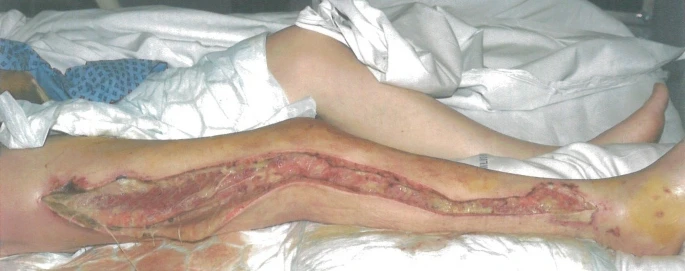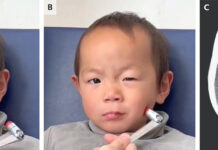
Multiple investigations finally concluded that this patient’s lower limb infection was a manifestation of an underlying caecal carcinoma.
A male patient presented to the hospital with complaints of fever and confusion for two days. His fever was low-grade and was associated with rigors. Moreover, he complained of a swollen right thigh too. The patient underwent blood tests for insidious anemia two weeks ago and was awaiting his results when these symptoms of fever and a swollen leg showed up. He also reported having hypertension and type 2 diabetes which according to the patient were under control.
Physical Examination and Related Investigations
On physical examination, doctors noticed a swollen tender right thigh with signs of inflammation extending from the upper thigh to below the knee. Oedema also involved the calf and was associated with pain, especially on flexion and abduction of the hip. His other systems were normal with adequate cardiopulmonary function.
The blood tests of the patient indicated anemia. They also revealed leukocytosis and elevated C reactive protein confirming an acute infection. Based on these findings, doctors made an initial diagnosis of DVT or cellulitis and started the patient on antibiotic and fractionated heparin along with referring the patient for further investigations.
CT Reveals a Perforated Caecal Carcinoma
Doctors subjected the patient to a lot of additional investigations including chest X-ray and urine analysis. On a CT chest, abdomen, and pelvis, they found out a thickening in the cecal region with its perforation into the retroperitoneal space. Doctors concluded that this perforation had involved the psoas muscle resulting in a psoas abscess. The abscess had further grown to involve the iliacus muscle, the groin, and all the way up to the knee. Differentials finally considered included appendicular mass, lymphoma, Crohn’s disease, and a caecal carcinoma. However, on another CT, doctors confirmed that it was a caecal carcinoma perforated into the retroperitoneal space and grown up to cause necrotizing fasciitis of the right thigh and leg.
Management and Prognosis of Caecal Carcinoma
Doctors started with draining the purulent fluid leaked into the retroperitoneal space using CT-guided drainage. Moreover, they carried an extensive debridement of the right lateral thigh and the right leg. Foul-smelling bullae encountered during debridement were first drained. Doctors concluded they were consistent with the fasciitis.
After his initial operation, doctors shifted the patient to the intensive care unit (ICU) where he spent around two weeks until his condition got better. Moreover while in the ICU, the patient received two additional debridements and regular drainage of pus from his wounds on the thigh and leg. On his ninth day in the ICU when he showed signs of stabilization, doctors performed a loop ileostomy. They also took ileocecal biopsies through the same route on the 21st ICU day which revealed moderately differential caecal adenocarcinoma.
Multidisciplinary Management
A multidisciplinary team (MDT) meeting was done for the patient. The doctors decided to manage the wound first for which they put a tissue viability team in action. After proper wound care and healing, they performed a right hemicolectomy with a defunctioning ileostomy. The resected specimen was confirmed as poorly differentiated caecal carcinoma on histopathology. The good thing was that there were no positive lymph nodes or any signs of systemic spread. Doctors also kept the patient on chemotherapy post-operatively.
Colorectal Carcinoma and Necrotizing Fasciitis
Colorectal carcinoma is a fairly common cancer worldwide, affecting middle age and adult populations. Most cancers involve the right side and take years to develop. Common presenting complaints remain anemia, pain in the right lower quadrant with or without a palpable mass, and weight loss.
Cancers involving the descending colon often lead to perforation and thigh abscesses. However, this case of caecal carcinoma perforation resulting in necrotizing fasciitis of the right thing and leg is very rare (one of the two ever documented). The treatment protocol remains extensive debridement for fasciitis followed by resection of carcinoma and ileostomy.



